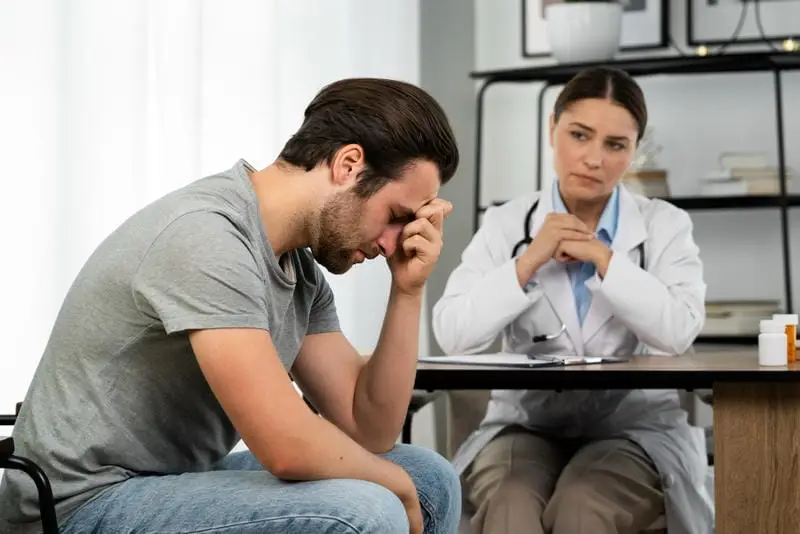- Published on: Jun 09, 2025
- 3 minute read
- By: Secondmedic Expert
Dengue Fever Symptoms In Early Monsoon: What You Should Know
As the early monsoon rains begin to fall across India, they bring much-needed relief from the scorching summer heat. But along with the cool showers comes a sharp rise in mosquito-borne illnesses—especially Dengue Fever. This illness affects thousands every year, and early detection is the key to fast recovery.
In this blog, we'll break down everything you need to know about Dengue Fever symptoms in early monsoon, how to stay safe, when to get tested, and how you can protect your family.
Why Dengue Fever Spikes in Early Monsoon?
The monsoon season creates the perfect environment for mosquitoes, especially the Aedes aegypti mosquito that transmits dengue. Stagnant water collects in drains, pots, coolers, and even bottle caps, allowing mosquitoes to breed rapidly.
Unlike malaria, which spreads during the night, dengue mosquitoes bite during the day, making them even more dangerous for schoolchildren and office-goers.
What is Dengue Fever?
Dengue is a viral infection caused by the dengue virus (DENV), which has four different strains. Once infected with one type, you gain lifelong immunity to that type, but subsequent infections with a different strain can be more severe.
There is no specific cure for dengue, so early diagnosis and symptom management are crucial.
Common Dengue Fever Symptoms in Early Monsoon
Symptoms usually appear 4 to 10 days after being bitten by an infected mosquito. They can range from mild to severe.
Here are the top signs to watch for:
1. Sudden High Fever (104°F or above)
One of the first symptoms. The fever appears quickly and is often accompanied by chills.
2. Severe Headache
Particularly behind the eyes, this is one of the most consistent signs of dengue.
3. Pain in Muscles and Joints (Breakbone Fever)
Extreme body pain gives dengue its nickname "breakbone fever."
4. Nausea and Vomiting
These symptoms may appear early and worsen as the infection progresses.
5. Skin Rash
A red, patchy rash appears on the skin, usually 2–5 days after fever starts.
6. Fatigue and Weakness
Even after the fever subsides, weakness can last for weeks.
7. Low Platelet Count
Detected through blood tests, this is the most serious indicator and must be monitored closely.
Warning Signs of Severe Dengue
If left untreated or if it worsens, dengue can develop into Dengue Hemorrhagic Fever or Dengue Shock Syndrome, both of which are life-threatening.
Seek immediate medical help if you notice:
-
Bleeding gums or nose
-
Blood in urine or stool
-
Vomiting blood
-
Severe abdominal pain
-
Difficulty breathing
-
Persistent vomiting
When Should You Get Tested?
If you have a fever for more than 2 days, especially during the monsoon, get tested immediately.
Recommended tests:
-
Dengue NS1 Antigen Test (for early detection)
-
Dengue IgG & IgM Test
-
Complete Blood Count (CBC)
-
Platelet Count
-
Liver Function Test (LFT)
You can book all these tests from SecondMedic.com, powered by Thyrocare, from the comfort of your home.
How to Prevent Dengue During Monsoon
Here are some simple yet effective tips:
Don’t Let Water Accumulate
Empty buckets, coolers, flowerpots, and unused containers regularly.
Use Mosquito Repellents
Apply creams or sprays, especially during the day when dengue mosquitoes are active.
Wear Full-Sleeved Clothing
Covering your arms and legs can reduce mosquito bites significantly.
Use Mosquito Nets and Screens
Even though these mosquitoes bite during the day, nets can offer added protection.
Keep Your Surroundings Clean
Avoid litter and waterlogging near your house or society.
Who is Most at Risk?
Dengue can affect anyone, but certain groups are more vulnerable:
-
Children
-
Elderly people
-
Pregnant women
-
People with weakened immunity
If you or a loved one falls into these categories, it’s even more important to take extra precautions during the early monsoon season.
When to See a Doctor
-
If you have a high fever that does not respond to paracetamol
-
If symptoms worsen after 2–3 days of self-treatment
-
If there are signs of internal bleeding or low platelet count
Don't delay. Dengue is manageable if caught early.
Recovery Tips After Dengue
-
Stay well-hydrated (ORS, coconut water, soups)
-
Eat iron-rich foods to rebuild your blood count
-
Avoid physical exertion for at least 2–3 weeks
-
Follow up with blood tests to monitor platelet recovery
Conclusion
The monsoon season is refreshing but brings hidden dangers like dengue. Recognizing Dengue Fever Symptoms in Early Monsoon can help you take action quickly, protect your family, and reduce health risks.
If you notice any symptoms of dengue fever in early monsoon, book a test today on www.secondmedic.com and consult with expert doctors online.
Read FAQs
A. Common early symptoms include sudden high fever, severe headache, joint pain, nausea, fatigue, and low platelet count.
A. Dengue spreads more in early monsoon due to stagnant water that becomes breeding grounds for Aedes mosquitoes.
A. You should get tested if you have a fever lasting more than 2 days, especially during the monsoon season.
A. Tests include Dengue NS1 Antigen, IgG/IgM Antibodies, Complete Blood Count (CBC), and Platelet Count.
A. Avoid stagnant water, use mosquito repellent, wear full sleeves, and keep your surroundings clean.









